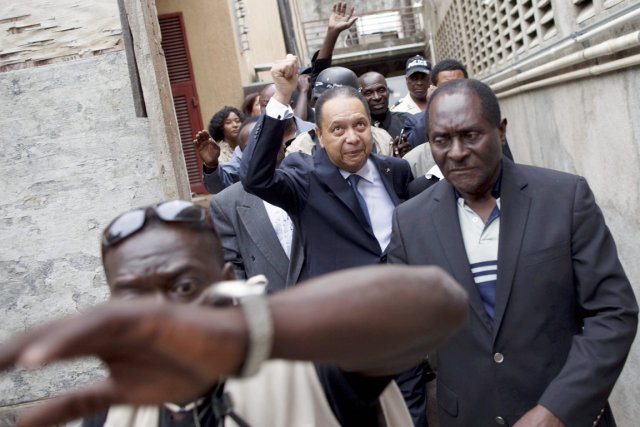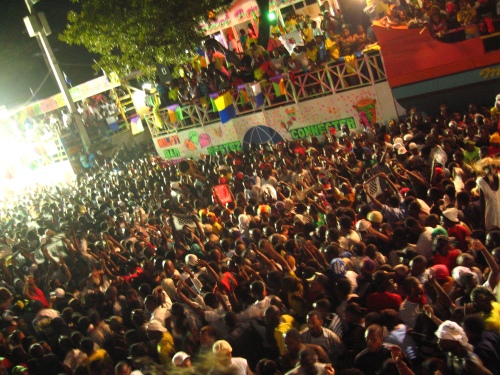Widgetized Section
Go to Admin » Appearance » Widgets » and move Gabfire Widget: Social into that MastheadOverlay zone
Manno Charlemagne and the struggle for a new Haiti
Partager/Share this

For over 30 years, Manno Charlemagne has been the vocal conscience of Haiti. As a singer, songwriter, political activist, and one-time mayor of Port-au-Prince, he has constantly challenged the status quo and stood up for the millions of poor Haitians who otherwise would have had no voice.
A soulful yet brazen balladeer, Manno for decades used his acoustic guitar and tender baritone voice as weapons against the brutal Duvalier regime and civilized indifference of Haiti’s insulated upper class. A skinny, poor rebel from the slums, he was the little black fly in a cold glass of milk.
Born in 1948, he slipped out of his mother’s womb with a clenched fist thrust up in the air; his birthsong was defiance. He picked up his first guitar as a teenager and has been playing, singing and writing songs ever since. In the classic troubadour tradition, he is a teller of truth who disguises his profoundly political messages by placing them inside hauntingly beautiful melodies. Similar to the storytelling traditions of the African griots who passed their history down through the generations from mouth to ear, Manno’s protest songs with their caustic lyrics and gentle rhythms documented centuries of abuse suffered by the peasant class in Haiti, and captured the rawness of life in this black republic.
Never one to paint pretty pictures to please the crowds or pay the bills, Manno has always sung from his heart.
He also paid the price for singing from his heart. Many times throughout his life in Haiti he was arrested and jailed because of his music. He was taken to the National Palace and psychologically tortured for days on end. The Ton-Ton Macoutes monitored his ever move. And several of his closest friends and political allies had their hands cut off, their tongues cut out, and their heads severed from their bodies.
Following the political coup of 1991, Manno, fearing for his life, took refuge in the Argentine embassy in Port-au-Prince. Word about his situation spread to the US and then on to a high profile friend of his—film director Jonathan Demme. Demme banded together with a group of his friends—Bob Dylan, Paul Simon, James Earl Jones and Robert De Niro—and lobbied on Manno’s behalf to set free and grant him political exile in the US.
Following the U.S. invasion of Haiti in 1994, Manno returned to the island. As a joke, a group of his friends put his name on the mayoral ballot. His campaign symbol was a guitar, and his slogan: Manno: Pourquoi Pas? In no time, a momentum took hold and city residents relished the rich irony of electing their favorite folk singer as mayor of Port-au-Prince.
Admitting that being a politician was never his true calling, Manno eventually decided to leave that arena to others, and returned to what he does best—singing songs about the country he loves to audiences in Miami, New York, Washington, Montreal, and Paris. In 2006 Haitian-based FOKAL and the Open Society Institute published a special edition book to honor him: Manno Charlemagne—Thirty Years of Songs. Today, he lives in South Florida and regularly performs at Tap Tap, a Haitian restaurant and nightclub in South Beach.
CD’s OF MANNO CHARLEMAGNE include:
Manno et Marco, 1978
Konviksyon (Conviction), 1982
Fini Les Colonies (No More Colonies), 1984
Organizasyon Mondyal (International Organizations), 1988
La Fimen (Smoke), 1994
Manno at Tap Tap, 2004
Les Inedits de Manno Charlemagne (The Unpublished Songs), 2006
Cliquez sur la fleche pour voir la video
Partager/Share this



























































